HRISTIAN EADER
March / April 2018








































March / April 2018







































U.S. Mennonite Brethren are being encouraged to think of ourselves as followers of Jesus who live on mission regardless of whether or not we live in our home culture or country. USMB, the C2C church planting network and MB Mission are together inviting us to be a faith community that is on One Mission— local, national and global. So, what does this mean for those of us who are not missionaries or evangelists? Who are not church planters or pastors? How do you and I live on mission? Where do we begin?
2 Timothy 1:5 provides an answer. In this verse, the apostle Paul recalls Timothy’s spiritual roots: “I have been reminded of your sincere faith, which first lived in your grandmother Lois and in your mother Eunice and, I am persuaded, now lives in you also.”
For many of us, our immediate and best opportunity to live missionally is in our homes and with our families. One of the clearest callings of parents is to disciple their children. We should show the same energy, commitment and interest in discipling our children as we have demonstrated for their efforts in youth sports or music. Discipling our children is a life-long commitment and one that we as parents don’t “retire” from. We are in this for the long haul and we will pray for, support and encourage our children in their faith even as our relationships change over the years.
As we move through Lent and anticipate Easter Sunday, I invite you to prepare for a Resurrection Day of remembrance and celebration that is rooted in 2 Timothy 1:5. The faith of Lois and Eunice lived on in Timothy. Who planted and nurtured the seed of your faith? Who provided the care that allowed you to be rooted in the good news of Jesus? Who will you remember and celebrate? Hebrews 12 speaks of a “great cloud of witnesses” that surrounds us as we run the race of life. Who are your personal cheerleaders in that crowd?
We have all been blessed by men and women who disciple us, followers of Jesus who are “older” than us spiritually and who share their lives with us freely. For a lot of us, the people who have persevered in loving and nurturing us over the years are our parents and grandparents. For others of us, circumstances have caused us to look elsewhere for mentors. This Easter, let’s thank these people for the roles they play in our lives and celebrate that they are disciples who make disciples.◗

Faber has served as editor of Christian Leader since 2004. She and her husband, David, are members of Ebenfeld MB Church, Hillsboro, Kan.
Vol. 81, No. 2 March /April 2018
Connie
Faber
EDITOR
EDITOR
The Christian Leader (ISSN 0009-5149) is a gathering place for the people, passions and mission of U.S Mennonite Brethren. The Christian Leader is published bimonthly by the U.S. Conference of Mennonite Brethren Churches. However, the opinions expressed here are not necessarily those of the church as a whole.
COPYRIGHT: The articles printed in the Christian Leader are owned by the CL or by the author and may not be reprinted without permission. Unless noted, Scripture quotations are from the New International Version.
READER PARTICIPATION: Letters to the editor should be 300 words or less and on one subject. Letters must be signed and include the writer’s city and state. Letters will be edited for clarity, appropriateness and length. Letters will be published, as space allows, unless marked, “Not for publication.”
Freelance article submissions are welcome; a SASE must accompany articles.
SUBSCRIPTIONS: $10 for six issues and $20 for 12 issues ($15, $30 in Canada; all other countries $25 for six issues); $1.50 per copy
CORRESPONDENCE: All correspondence, including subscription questions and address updates, should be addressed to Christian Leader
Box 155, 107 N. Main Hillsboro, KS 67063-0155
Phone: 620.947.5543 Email: editor@usmb.org
MEMBERSHIP: The Christian Leader is a member of the Evangelical Press Association and Meetinghouse, an association of Mennonite and Brethren in Christ editors.
POSTMASTER: Send address changes to Christian Leader, Box 155, Hillsboro, KS 67063. Periodicals postage paid at Hillsboro, Kansas.
The Christian Leader is published by

The U.S. Conference Board of Faith and Life (BFL) hosted a BFL Summit Jan. 9-10 in Phoenix, Ariz. Because of recent interest in changing credentialing policy, all district BFLs were invited to gather to talk specifically about the U.S. Mennonite Brethren policy that allows licensure of women in pastoral positions, with the exception of the lead pastor.
The U.S. BFL listened to the district BFLs’ positions on this issue and received input on whether or not there was an interest in changing the policy to allow individual churches to discern from their context and biblical understanding whether it would be appropriate to license a woman as a lead pastor. Because this is an issue of great importance to all USMB churches, U.S. BFL believed it would be of value to involve district boards in discussing how any change in the policy might affect or be received by the churches in that district.
The group spent time considering how the denomination might be able to deal with disagreements over theological issues of all kinds and remain united. Larry Martens, former professor and president at MB Biblical Seminary, now Fresno Pacific Biblical Seminary, led participants through a Bible study on Acts 15, Romans 14 and John 17. The focus was on how the apostles led the church through similar disagreements on faith and practice.
It was stressed to participants that the summit was not a decision-making event and that any recommendation to change the policy would need to be taken to a U.S. Conference convention for a vote by delegates. U.S. BFL has indicated it has no immediate plans to do so.
District BFLs expressed a common sense of failure to support and encourage congregations to abide by the current policy that encourages churches to include women in all levels of leadership in the local church, except for lead pastor.
Opportunity was given for district BFLs to share other concerns and to talk about the potential of working more closely with one another and U.S. BFL in the future. Participants were grateful for the chance to network with one another, voice their perspectives and participate in conversations about mutual theological and practical concerns. Attendees expressed interest in getting together again in the future.—U.S. BFL
MB Foundation is sponsoring an optional tour of South Mountain Community Church (SMCC) and its ministry during the 2018 U.S. Mennonite Brethren biennial national convention and pastors’ conference in Salt Lake City, Utah, July 24-28.
The tour, Thursday afternoon, July 26, will highlight the grip of Mormonism in Salt Lake City and the impact Mennonite Brethren have had as God has anointed the ministry of SMCC. The tour will include a stop at Temple Square to better understand Mormon culture and visits to several SMCC campuses. Participants will

better understand the work of God through MB churches in Utah, as well as their own partnership in making this ministry possible. Cost is $10 per person and includes transportation and refreshments.
Online registration for the convention is now available, and registration forms have been mailed to each church. For more information, visit www.usmb.org/2018-nationalconvention—USMB/MBF
Fresno Pacific University, the Mennonite Brethren college in Fresno, Calif., was one of 19 schools to be named a finalist for the 2018 NCAA Division II Award of Excellence, an honor that recognizes campus and community engagement efforts over the past year and comes with a $500 award to be used for future community engagement.
The Sunbirds volunteered 1,859 combined hours of community service and community engagement last season, which included FPU’s annual Sunbird Sports Day for more than 200 kids of the surrounding community. The annual event is put on by the student-athlete advisory committee.
The PacWest Conference has honored the FPU athletic department for its community service contributions the last four seasons with a pair of community engagement awards and two Make-A-Wish honors. Division II annually honors its members for leading events that exemplify any of the six Division II attributes: learning, balance, resourcefulness, sportsmanship, passion and service. A committee of athletics administrators determined this year’s finalists, and the Division II Student-Athlete Advisory Committee selected the winner, which was announced during the 2018 NCAA Convention held Jan. 20 in Indianapolis, Ind. Northwood University, Midland, Mich., was chosen as the winner. —FPU/NCAA
Graduates who thought exams were over were reminded during Fresno Pacific University’s commencement ceremonies Dec. 16, 2017, that their most important test lies in the future.
“Decades from now…you will look back and ask: What did I do with my life? What difference have I made?” speaker D. Merrill Ewert told the crowd in downtown Fresno’s Selland Arena. “That’s the real test!”
About 487 students were eligible to participate in the event, 344 from bachelor’s degree completion programs, 73 from graduate programs—including those from Fresno Pacific Biblical Seminary—and 70 from traditional undergraduate programs. FPU president Joseph Jones and Donald Griffith, chair of the FPU Board of Trustees, presented the degrees. FPU is the Mennonite Brethren school headquartered in Fresno, Calif.
Other graduation celebrations were a baccalaureate for all graduates and a hooding ceremony for master’s degree graduates, both on Dec. 15. The baccalaureate was in the afternoon at Butler Church in Fresno, and the hooding was that evening in the Special Events Center on the main FPU campus.
Ewert, FPU president emeritus who led the university from 2002 to 2012, said
that whatever their degree or field of study, FPU graduates are needed in the world. “Some people in authority are abusing their positions. Neighbors have turned against each other over political and social issues,” he said. “The very fabric of our society is being ripped apart.”
Ewert cited three ways FPU graduates can serve: walking with grace, living in peace and acting with courage. “In these acrimonious times, our society is crying out for leaders who are centered, who have a strong moral compass, who respect and listen to others—even those with whom they disagree. Angry emails, snarky posts on social media and thoughtless tweets are causing irreparable harm to our relationships and to our institutions. It’s damaging civil society itself but doesn’t have to be that way. We can make a difference,” Ewert said.
Enjoy this day, Ewert urged the graduates, then use your degrees to help change the world. “I pray that in several decades, you’ll look back and be able to say, ‘I made a difference!’ You will, if you walk with grace, live in peace and act in courage.”—FPU
Tabor College, the Mennonite Brethren college in Hillsboro, Kan., announced Jan. 8 that the Shari Flaming

Center for the Arts, which was dedicated and opened in early December, has been completed debt free.
“With the combination of end-of-year gifts and the ongoing fulfillment of donor commitments, we are pleased to say that the building will have no outstanding debt,” says Tabor College president Jules Glanzer.
Glanzer announced at the Dec. 9, 2017, dedication ceremony the need for $150,000 in additional funds to complete the building project debt free. “We asked 1,000 people to give $1,000 to raise the final million dollars needed to be debt free,” Glanzer says. “We were overwhelmed with the response. The Grand Finale included 1,128 people for a total of $1,194,000 in contributions.”
The new building will host arts events for the public, including student and guest performances. Beginning in the spring semester, the campus community will gather in the auditorium for weekly chapel. The center includes a “We Proudly Serve” coffee shop which offers Starbucks coffee and specialty drinks.—TC
The April 16 deadline is approaching for two of the five 2017-18 research and writing grants offered by the Historical Commission of the U.S. and Canadian MB Conferences. The first is a project grant of up to $2,500 in support of a historical and/or theological project of interest to Mennonite Brethren around the world, and the second is a research grant of up to $2,000 in support of research and publication relating to the history and contribution of Mennonite Brethren women. This grant is made possible by the Katie Funk Wiebe Fund. Criteria and application details—as well as news releases about past recipients—for the five HC-funded initiatives are available at www.mbhistory.org. —HC
Mennonite World Conference requests prayer for those fleeing unrest and violence in the Democratic Republic of Congo. Congolese Mennonites are among the displaced and refugees, and many Congolese and Angolan Mennonites are hosting them.
In the “Good Samaritan” initiative, Kinshasa churches from Communauté Mennonite au Congo collected soap, clothing, canned goods and money for people suffering in the Kasai region of central DR Congo. District church leadership distributed the supplies the first weeks of January.
A response to the displacement caused by armed conflict in the Kasai region is being shaped and implemented by Congolese Mennonite and Mennonite Brethren church-based relief committees, coordinated by Mennonite Central Committee (MCC) and supported by global and U.S.and Canada-based Anabaptist organizations.—Mennonite World Conference/MCC

Mennonite Central Committee (MCC) seeks to replenish its supply of relief and hygiene kits to continue responding to needs around the world. Multiple situations of crisis in places like Syria, Iraq and Ukraine have depleted MCC’s warehouse inventory. To learn how to make a kit, visit www.mcc.org/get-involved/kits.—MCC

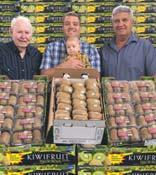

Where did this new kiwi come from?
Many new fruit varieties come from cross breeding, but this one came from a natural selection of plants grown from seed by this old Greek farmer. Since it grew naturally, the Greeks call it a gift from God.
How did you connect with a Greek kiwi grower?
The Greeks contacted a University of California professor I know, looking for someone who would be interested in growing their new kiwi. I’ve gone to Greece three times to meet with them. They gave us exclusive rights to the fruit here in America.
What made this Mega Kiwi an appealing product?
It’s 50 percent larger than a typical kiwi so after you peel it there’s plenty of kiwi to eat. Plus, kiwi is one of the most nutrient-dense fruits already and this one has twice the vitamin C and 60 percent more antioxidants.
How long does it take to develop a new crop like this?
Eight years ago, they shipped me about six pieces of wood. We
Jerry Kliewer
Three generations of the Kliewer family from Reedley MB Church grow fruit on their Central California farm. In 1973 they were one of the first local farmers to grow kiwifruit. This year they broke new ground, marketing the Mega Kiwi. They established a Guinness World Record with a kiwifruit weighing over 10 ounces. The Christian Leader talked with second generation Kliewer farmer, Jerry.
grafted them onto some of the plants I had, and a couple of the grafts took. After two years of quarantine, we were able to get more wood to graft more plants. This year the plants were mature enough for our first commercially marketable crop.
Do they require special cultivation techniques?
Our Central California desert is a different growing environment than Greece. When temperatures get over 100 degrees the plants shut down, so we’re growing everything under shade cloth and have cover crops to keep the humidity high.
How do you see your faith intersect with farming?
As farmers, we realize that everything we’ve been given is owned by God—not just the land and the plants, but also the earnings that might be generated from them. We want to make the most of what God has given us to manage.
Learn more at megakiwifruit.com.
InterviewbyKathyHeinrichsWiest
Evangelism involves seeing people as fully restored in Jesus
It’s no surprise that my children occasionally engage in the age-old practice of name-calling. Of course, my husband and I don’t allow this, but we have also made a point of teaching our children the difference between someone’s behavior and their identity. It isn’t that our fouryear-old never lies about whether or not she hit her big sister, but that doesn’t mean she is a liar. We want our children to understand how powerful name-calling can be.
As adults, we like to think that namecalling is a thing of the past; that we have left our childish ways behind. Can we, with integrity, say this is true when we reflect on the words that have parted from our lips or the attitudes we have justified in our private thoughts? It is easy to recognize all the things that are “wrong” with someone, all the things that need to be “fixed,” and to label them accordingly.
Sometimes we approach evangelism as if we are reflections of the Holy Spirit and are thus responsible for convicting and correcting. We begin to believe the enemy’s lie that what unbelieving people really need is to just stop sinning in order to be connected to God. I know that we have been called to be holy because God is holy (1 Peter 1), and I understand both the value and the importance of holiness. But evangelism is not about identifying sin. Evangelism is about the good news that we are loved and worth Christ’s sacrifice even “while we were still sinners” (Rom. 5:8).
“In this world we are like Jesus,” Paul writes in 1 John 4 after describing in length the importance of living in God’s
love—compelled by it, transformed through it, indwelled with it and messengers of it. Evangelism requires that we be like Jesus, who came to this world as a clear and undeniable expression and explanation of God’s love. Scripture says Jesus wasn’t assigned the job of convicting the world of their sins but of saving people from their sins (John 3:17). Holiness is not a pre-requisite for relationship with Jesus; that’s the whole point of the gospel. Evangelism requires us to see people as if they were fully restored in Jesus; only then can we speak the words of life over them that faith in Jesus offers. The young and weak Gideon was hiding in a wine press when a messenger of the Lord came and called him “mighty warrior”—as if being a victorious warrior was already his identity even though he had never fought in or won a single battle. The Lord spoke over Gideon his destiny in the Lord. The Lord’s restorative name-calling led to Gideon becoming exactly who God had made him to be. When I rub shoulders with unredeemed sinners, the enemy tempts me to do some name-calling: Jerk. Liar. Fool. Pervert. Drunk. Lost-cause. I am in direct contradiction to the work of the gospel when I let those curses flow from my lips. Instead, I’m asking the Holy Spirit to show me glimpses of who these people will be when their lives are saturated in God’s love and truth so that I can give my best shot at calling them names like Beloved, Wanted, Called, Important, Chosen, Forgiven, Healed, Whole, Restored.◗

Sara Jo Waldron has served as youth pastor at Hillsboro (Kan.) MB Church for six years and is currently chair of the Southern District Conference Youth Commission. She is co-activity director with her husband, Lee, at the SDC senior high camp. The Waldrons have three children and the family lives on the Tabor College campus where Lee is the resident director for the Men’s Quad.
God can transform our weaknesses for his good
Itook my first drink of alcohol when I was 14. Looking back now, I was in trouble from the start. I just didn’t know it at the time.
Alcohol became a coping mechanism for me after a series of tragic events shook my world when I was 8 or 9. Within an eight-month span, my parents got divorced, my grandfather died and my aunt committed suicide.
Although I grew up in a non-Christian home, I occasionally attended church and came to believe that if I prayed, God would favorably answer my prayers. My parents’ divorce and the deaths of my loved ones led me to the conclusion that if God was all-powerful, he didn’t care, or if he cared, he was powerless to work on my behalf.
I began to deal with these feelings of abandonment and loss by drinking alcohol. I drank off and on through high school. By the time I was 19 or 20, I was drinking every day, all the time. As long as I had the beer I needed, life was just fine. Not even inpatient alcohol treatment could curb my addiction as within two weeks of my release, I went back to drinking. For the next year, I often consumed a case of beer a day.
Realizing that something needed to change, I began attending Alcoholics Anonymous (AA) meetings. What started as a desire to quit drinking became a call to ministry, as my journey to sobriety led me to Jesus.
By attending church with my AA sponsor, I learned that getting clean and sober was a spiritual issue as I dealt with the wreckage of the past. I didn’t trust God because, in my mind, he had only let me down. The first step in my recovery was admitting I had a problem and being honest with myself about my anger with God.
I gave my life to Jesus while attending church with my AA sponsor. Through reading Scripture and talking to others, I gradually learned to trust God. He wanted to heal my hurts, even though not everything turns out the way I want.
Accountability and commitment were key to my recovery from alcoholism. In those early days, I wanted to drink so bad I could taste it. I felt like I was being dismantled as a person, like God was taking me apart and putting me back together in a different way. It was a daily living my way out of the mess I had lived my way into.
As I became healthier emotionally and spiritually, I lost my desire to drink. I developed a love for God’s word and his truth. I spent time in prayer and sensed a growing call to ministry. I was baptized, went on a mission trip and served a church internship. Others confirmed my gifts for ministry, leading me to attend Bible college and later, seminary.
Today, my pastoral ministry spans 17 years. Early on, many people from my home church poured their lives into me, and they are a big part of where I am today. Wherever I go, I find myself around people in recovery. My ministry has involved attending AA meetings and volunteering at drug and alcohol treatment centers. Sometimes when people learn I’m a pastor, their curiosity leads them to attend church.
I have been sober for 26 years now. While I don’t talk about it every Sunday when I preach, I do not hide my continual recovery from alcoholism. I’m willing to talk about the struggles I’ve had in the past because God is in the business of taking what we see as our weaknesses or screwups in life and turning them around and using them for his good. ◗

Jeff Turner is pastor of Christ Community Church in Sioux Falls, S.D., a position he’s held since May 2016. He and his wife, Angela, have two children: Ben (16) and Abby (14). Turner meets weekly with six or seven men at a drug and alcohol treatment center outside of Sioux Falls, helping them with the spiritual aspect of getting clean and sober. Turner believes the first step to recovery in any area of life is admitting there is a problem and being honest with oneself, God and others.
Being involved in their lives can bring our neighbors, friends to Jesus
vangelism. It’s a big word with some scary implications. One of those connotations for me is the word “witnessing,” an even more daunting concept. I don’t do it well, I don’t like it and I do all I can to avoid it—or being lumped in with those who do.
My fear of evangelism—witnessing—started early. I heard about it all the time in Sunday school and was encouraged to share my faith. At the time, I loved Jesus—privately. I wanted others to know him but hated that I was different. Mostly, I wanted to do some of what I perceived to be fun things, like movies, dances and even hanging out with my nonchurched school friends.
I worked as a waitress in an ice cream shop during my senior year of high school. One of my first experiences of witnessing in the workplace, a non-Christian environment, was by wellmeaning Christians who left booklets of the Four Spiritual Laws under their plates in lieu of a monetary tip. If I happened to notice that a Jesus-doubting server received that, I would always add my own tip as I was able, instead of the booklet. Not that I didn’t want my friends and co-workers to have a relationship with Jesus. I just knew their stories and didn’t want to give them additional fodder for rejecting God.
Now years later, as a leader in our church, those connotations still linger. I feel fortunate, however, to be married to someone without the language baggage of these theological words. Someone who has taught me, by his example and his words these past 26 years in the ministry, to strip away some of the old words and live how they were intended. Someone who has pointed me to Jesus and caused me to rethink some of these thoughts I’ve been resistant to.
At Copper Hills Church, we don’t use the words evangelism or witnessing very much. We do talk about loving our neighbors and “taking notice and taking interest” in their lives. We talk about increasingly thinking like Jesus so that we are increasingly mistaken for him.
We talk about the fact that we don’t live where we live because the house was a great deal in the most ideal neighborhood, though it may be that. We don’t work where we work because the job best fits our needs and pays the bills, though it probably fits that. We don’t exercise where we exercise because it’s the best gym with the best trainers or go to school where we do because the degree best fits our goals or the schools are rated the highest, though they may be.
We live where we live because God wants for us to be a reasonable representation of him on that street or in that neighborhood, at that workplace, gym or school. We notice our neighbors, co-workers and skeptic friends and take interest in their lives. We take time to find out about them and love them.
When we first moved to Phoenix, it took seven years before our neighbor across the street finally responded to our overtures of friendship. We had tried to get to know Jim and his wife on numerous occasions by inviting them over. We brought them gifts at Christmas or baking throughout the year. One day he came over while we were cleaning out our garage. He came for help because his family was in distress. He knew my husband,
By Elfie Klassen
It’s not our job to convert people to Jesus. It is our joy to be ready to explain our hope in Jesus.
Brad, is a pastor. And he thought our family was perfect, because he hadn’t seen us yell at our kids or use bad language as he watched us move church equipment in and out of our garage in those early days of church planting.
Misty has a woodworking shop in their garage and because the relationship has grown over the last year, both Dan and Lori come across the street out of curiosity, as Misty works on all sorts of projects for their home.
An open garage, a welcoming heart and little by little, without being conscious of it, Dan and Lori are being enveloped with Jesus followers who love them unconditionally. Believers who are ready “in season and out to give a reason for their hope, with respect and gentleness.”
I work as a health coach in a family practice and medspa. I’ve worked with the doctors and some of my colleagues for almost nine years. I think it’s the perfect part-time job, but really it’s an opportunity to take notice and take interest in the lives of my coworkers and clients. I’ve been able to point discouraged believers back to Jesus during our conversations. I’ve invited lonely and disheartened Jesus-doubters to my church or pointed them to Bible-believing churches near them that I know would be a good match for them. Co-workers ask me about issues they are struggling with, and I always point them to Jesus—the one that can heal their deepest disappointments and hurts. I love my friends at work, so I intentionally “take notice and take interest” in their lives.
A couple from our church has taken the concept of “take notice and take interest” to a whole new level. Ed noticed that Dan, his neighbor across the street, had an old army Humvee. Ed has always been interested in four-wheeling and wondered whether an old Humvee would be just as good as any other for desert off-road activities. Ed talked to Dan about his choice of vehicles and what sort of things he did with it. Eventually, Ed bought a Humvee just like Dan’s so they would have something more in common.
With this common interest, Ed has invited Dan to go four-wheeling with other men from church. In fact, one Monday late in November, with two Humvees and a jeep, the Copper Hills staff got to go on an adventure in the desert. Dan was rubbing shoulders with normal men and women who happened to be on staff at a church. Ed and Dan have also attended car shows on the Copper Hills parking lot, together with their Humvees.
The story doesn’t end here. Ed and Misty continue to look for ways to engage both Dan and his wife, Lori.
Not everyone is able to adequately explain the gospel message with Bible verses to satisfy all the questions. But all believers have a story of hope—their story of what life was like before they knew Jesus loved them. Their story of what it was that caused them to explore who Jesus is and produced a willingness in them to get to know him. And finally, their story of how life is different for them now that they don’t have to be in charge of their destiny.
We all have a story. All we need to do is think through it and prepare it ahead of time. Maybe even practice the main points with another Jesus-follower so that when the time is right, we’ll be ready. As Peter writes in 1 Peter 3:15–16, “If someone asks about your hope as a believer, always be ready to explain it. But do this in a gentle and respectful way.”
It’s not our job to convert people to Jesus. It is our joy to be ready to explain our hope in Jesus. It’s our responsibility to authentically and consistently live a good life because we belong to Christ.
Elfie Klassen lives in Phoenix, Ariz., with Brad, her husband of 38 years who is lead pastor of Copper Hills Church. She is a certified life coach, specializing in the area of health and wellnesss, and helps people make lifestyle changes. When not in the office, you can find Elfie out on the hills training for different events. Recently she completed her first trail half-marathon and now is training for her first Tough Mudder team obstacle course event.
Four Ws that empower believers to share the gospel
It was late and I had a 45-minute drive ahead of me. I was already groggy, and so I pulled into a Get ‘n Go to buy a coffee. The cashier who processed my purchase looked as tired as I felt.
As I walked toward the door, I remembered my desire to more regularly share the love of Jesus with people, so I stopped and asked her a simple question, “Excuse me, but is there any way that I can pray for you?”
Her response revealed her surprise. “Oh. No, I’m doing okay. Thanks.”
And that could have been that. I could have walked out the door, but I didn’t. I asked another question: “I’m wondering, if God could do a miracle in your life, what would you want him to do?”
And then I saw the Holy Spirit work. She began to tell her story—of her daughter being bullied at school and her husband not having work and not doing much to find work. The story of her health problems.
The store was empty, and so I asked if I could pray. She said yes. I prayed a simple prayer for her and her family and for God to meet her in the struggle. When I was done, she
thanked me through her tears. No one had ever prayed for her before, she said. I replied that God loved her.
I asked if I could stop by next week and see how things were going. I walked to my car, thanking God for the opportunity to share his love with someone lost in brokenness.
As I engage with followers of Jesus around the idea of making disciples, there are a host of common hurdles that seem to prevent Christians from sharing the gospel with friends and strangers.
Many don’t know how to share the gospel, or they may struggle to know how to transition to sharing. Others are afraid of how people might respond, afraid of looking fanatical or of offending. Some simply don’t understand the gospel and so struggle to know why they should share at all.
Regardless of the reasons, there are four questions that, when answered, empower believers to more actively share the gospel with others. These questions come from the 411 Gospel Conversation Training, a key component of MB Mission’s Everywhere to Everywhere (E2E) events.
Question 1: Why share the gospel?
In Matthew 28, Jesus commands his disciples to “go and make disciples of all nations, baptizing them in the name of the Father and of the Son and of the Holy Spirit.” He adds the promise to this command that he will be with us “to the very end of the age.” In light of Jesus’ words in John 14, “If you love me, you will keep my commands,” it seems apparent that Jesus intends that all who choose to follow him will dedicate their lives to making disciples, a process that begins with sharing the gospel with the lost.
But if Jesus’ command is not enough, we must understand that sharing his love with those who don’t yet know God is central to a Christian’s identity. In 2 Corinthians 5:17-21, those who are in Christ are identified as “new creations.” What a glorious gift from our Father!
But along with that gift comes a simple job description: We are ministers of reconciliation, “Christ’s ambassadors, as though God were making his appeal through us.” There is no separating our identity as new creations from our identity as ambassadors. And that is why we share the gospel with those who are far from God.
Question 2: Who should I share the gospel with?
When thinking about who to share the gospel with, it is helpful to think about two lenses. The first lens represents those people with whom you have an ongoing relationship. This is your relational network: your friends and family, coworkers and classmates and neighbors. They are people

By Aaron Myers

with whom you have regular, ongoing connection, and as we interact with this group we are called to be patient and persistent. We must commit to daily prayer for them and to loving service coupled with Spirit-led sharing.
The second lens is God-prepared people that we don’t yet know. They are strangers but are the people Jesus is drawing to himself (John 12:32), and we find them by sowing the good news broadly. They are the person of peace in Luke 10; they are the woman at the well; they are the young lady behind the counter at the gas station. We find them by fishing—by asking to pray for a stranger, by making comments that will lead to spiritual conversations, by putting ourselves in the harvest among the lost and then looking for opportunities to share. We prayerfully look to share with anyone, anywhere and anytime, trusting that the Holy Spirit will lead us to the people that are being drawn to God.
Question 3: What should I share with others?
Throughout the New Testament we see two basic patterns of sharing. The first is your story. It is the work that God has done in your life. Paul routinely tells of his Damascus road experience. The woman at the well returns to her village with one sentence: “Come see a man who knew everything about me.” And when the demon-possessed man begs to come with Jesus, he is told to return home and “tell how much God has done for you.” Our stories are important to God, and he delights to use them to introduce others to himself.
A simple outline to help shape your story is to choose two words that describe your life before Christ, two words to describe how you encountered Christ and then two words that describe your new life of faith.
Add an introduction, “There was a time in my life when...” and a question to wrap up, “Do you have a story like that?” and you have a simple 15-second testimony that will allow you to introduce Christ into a conversation.
Sharing your story creates an opportunity to discern where the person is at and transition to the second pattern of sharing: telling God’s story. There are many great tools for sharing the gospel, and the truth is that they all work. Whether it is Roman’s Road, the Bridge Illustration or some other resource, it’s never about the tool and always about the God who is drawing people to himself as we step out in faith to share.
One simple tool we train E2E participants to use is called Three Circles. It can be shared visually in about three minutes. It is best done on a note card which you can leave with the person. It is simple and easily learned.
The most important thing is that you know a simple way to share the gospel and then that you use it. So, find a tool to share the gospel and then dedicate time to learning it. But remember, the perfect gospel presentation does little good if you don’t share it.
Question 4: When should I share with others?
In a busy world, the greatest hurdle to overcome is often our own schedules. Those who are regularly sharing the gospel have learned one thing: You have to be intentional. Hockey star Wayne Gretzky famously said, “I missed 100% of the shots that I never took.”
All the tools and training in the world mean little if we don’t intentionally share the gospel. We must become dedicated to the idea that the God of the universe wants to use us—everyone who calls on the name of Jesus to be saved— to introduce others to his plan of salvation for their lives.
Here are three simple assignments to move you toward intentionality.
■ Make a list of everyone you can think of in your life who you think is far from God. Commit to pray daily for everyone on the list. Set an alarm on your phone to remind you to pray. Ask God for opportunities to share with them and for his spirit to open their hearts to God.
■ Take 15 minutes to write out your 15-second testimony. Practice saying it until you’ve memorized it.
■ Search “Three Circles Gospel” on You Tube and learn to share it. Practice it.
God desires to use you to help people lost in darkness find their way into his kingdom. He will do that as you become more intentional in sharing God’s love with others. Commit yourself to prayer and to being equipped and then step out in faith and begin sharing the good news of Jesus with others.
When I returned to visit my new friend at Get ‘n Go the following week, she greeted me with a huge smile and said, “Last week was the best week my daughter has had in months.” As she told me about the week, she repeatedly said, “Thank you so much for praying.”
That night I shared my 15-second testimony with her: “There was a time in my life when I worked really hard to appear religious, but really I was far from God. But Jesus forgave me for my sins, and I chose to follow him. Then I was filled with peace and purpose as I began to serve him. Do you have a story like that?”
In subsequent weeks, I was able to share Three Circles and stories from the Bible and to continue to pray for her. She hasn’t yet decided to follow Jesus, but I believe God is drawing her to himself. The seed has been planted.
Aaron Myers serves as a mission mobilizer with MB Mission in the Midwest and as the South Dakota area coordinator for Crescent Project. He and his wife, Consuelo, have been married for 16 years and have two children. They have served as missionaries and church planters in Istanbul, Turkey. If you’d like to learn more about E2E Training, visit www.mbmission.org/action/e2e/vision


By Fred Leonard

When we become followers of Jesus we begin a great journey of discipleship, the process of becoming more like Jesus. Jesus came on mission to bring glory to God by seeking and saving the lost (Luke 19:10), and we are called to do the same.
For some reason, we often think people who are followers of Jesus naturally know how to share Jesus with others and lead them to salvation. This isn’t true. It’s likely that people who have been followers of Jesus for a long time are not in the habit of sharing the good news and don’t know how to share Jesus.
It’s also true that when people come into a personal relationship with Jesus they are ready and passionate to share their newfound life and freedom with their friends, most of whom do not know Jesus. However, people who have just said yes to Jesus are not always sure how to gracefully share about the Jesus they have just met.
Focus on four words
At Mountain View Community Church, we work at equipping the saints to share their story of salvation. We begin that
process by encouraging people to prepare a two to threeminute Gospel-centered testimony that is understandable to a non-Christian and will present them with the opportunity to choose to also follow Jesus.
The framework of this testimony is a four-part salvation story contained in four words and corresponding verses.
God: God loves you and has created you to know him personally. He has a wonderful plan for your life (John 3:16-17).
Sin: People are sinful and separated from God, so we cannot know him personally or experience his love and plan (Romans 3:23, 6:23).
Jesus: Jesus Christ is God’s only provision for our sin. Through him alone, we can know God personally and experience God’s love and his plan (John 14:6).
Individual: We must individually receive Jesus Christ as Savior and Lord; then we can know God personally and experience his love and plan (John 1:12; Ephesians 2:8,9).
These four words and verses make up the core of our salvation story and are combined with our personal narrative to create a testimony that is clear and to the point. We should be able to present our salvation testimony in such a way that the
person we are sharing it with can easily figure out how we came to salvation and how they can do the same. This is not your life story. It is not detailed or long. This is your salvation testimony that includes a clear presentation of the good news for the purpose of this person finding Jesus. It is critical to keep it simple by just telling what happened to you.
Who can say no to a story?
Imagine someone says to you, “You seem really different, like way more peaceful than a lot of people I know. What’s up with that?” You can respond in one of the following ways, depending on your personal story.
If you came to Christ as an adult, respond by saying, “I wasn’t always like this. I had a life-changing encounter with God. May I tell you my story?”

If you came to Christ as a child, respond by saying, “I came to know God as a child, and it has affected my life ever since. May I tell you my story?”
Who can say “no” to you sharing your story? The key is that it is short and focused on Jesus so they stay engaged and focused. I know it’s surprising—but people are not as interested in our life stories as we think they are! But in our salvation testimony we are presenting Jesus the Savior and telling people what he has done for us, and this is far more interesting and engaging. We are speaking under the empowerment of the Holy Spirit, who is drawing people to himself.
As you prepare your salvation testimony, it should include seven points:
• the main thing that caused you to look to God.
• how you first heard of God’s love and his plan for your life.
• a description of how you were trapped in sin and had no means of freedom from it.
• how you heard about Jesus and his death on the cross.
• how God prepared your heart in bringing you to a place where you desired to be in right relationship with him. This is when you share the four points and corresponding Scriptures centered on the words God, sin, Jesus and individual.
• the salvation prayer that changed your life and how you surrendered to God’s desire for your life. How you repented—turned intentionally away—from your life of sin and independence from God. How you asked Jesus to become your Savior and leader and how you began to let him lead your life according to his will.
• a few examples of how you yielded to God, including what it looks like to submit your life to God’s will.
Practice your two- to three-minute testimony until it feels comfortable and until you can do it in less than three minutes.
The right tool
It is important for this testimony to be person-specific. Think of examples that relate to your friend who is a teacher that are different from the ones you would share with your friend in the gym. We should take the time to change the examples and think it through for all of our lost friends. We
We don’t try to hammer a nail with a wrench or undo a bolt with a saw when we are building something. We need the right tool at the right time to effectively get the job done. It is the same with leading people into a life-changing salvation encounter with Jesus. My basketball friends understand basketball analogies, but I wouldn’t use those same analogies with my book club friends.
More so, we need to have a purpose for sharing our salvation testimonies. If all we do is simply tell a story, then we are just that—storytellers. That’s why we should follow up our testimonies by saying, “He did all this for me, and he will do it for you, too. Would you like to ask Jesus Christ into your life now?” You should also pose the following questions to diagnose their spiritual destiny.
1. If you were to die today, would you go to heaven?
2. Why would God let you into his heaven?
3. Would you like to know for sure?
If your friend says “yes,” then this is where you shift gears and walk him or her through a salvation encounter. This critical moment is where we become more than storytellers. This moment is where we allow Jesus to use us in an incredibly powerful way.
Salvation encounters are life-changing, eternity-shifting moments. It’s important to take the time to make sure your friends understand clearly the decision they’re making: Jesus Christ is their Savior and they are turning leadership of their lives over to him. Be prepared to lead them in a prayer of surrendering themselves to Christ, repenting of their sin, asking Jesus to be the Lord and leader of their lives and yielding their lives to his will.
As a believer in the body of Christ, it is an incredible privilege to lead somebody into the kingdom. A well-prepared, brief salvation testimony is an important tool to this end. Be ready.
Fred Leonard is the lead pastor at Mountain View Community Church in Fresno, California. He wants to see God’s kingdom come and to be a world-changing, risk-taker for Jesus. He loves serving Jesus and the church with his wife, Esther, and their four children. Leonard has a doctorate of ministry from Fuller Theological Seminary and continues to have a passion to learn and is always reading, meeting people, asking questions and pushing the envelope.
Many years ago, Claude Tambatamba received a clear vision from God about his calling. He stood before a towering mountain and was given a tool to make the terrain flat. Sweat beaded down his face, and he wished he wouldn’t have to complete the task alone.
“This is your job,” God responded. “Nobody else can do this. I will be with you. If you get tired, I will help you.”
When the ground was finally flat, Tambatamba was given a heavy tent to set up. Again, he doubted he could do it by himself. Again, God offered his help. Soon, the thousands of people that had been watching him came inside the tent.
“Your calling is not to be a pastor,” God said. “Your calling is to dig new places where they don’t know about salvation, to dig the hearts of people and bring them to the kingdom of God. After bringing those people in, you are to make another mountain flat. I call you to be an apostle.”
“I am very happy to have that calling,” Tambatamba says. “It’s fun to win the hearts of people to Jesus. If only one person came to receive Jesus, I will be happy to give. I will go to every country to do his work.”
Tambatamba has fulfilled and continues to fulfill this calling in many places, including as the pastor of a new congregation that recently joined the U.S. Mennonite Brethren family.
Tambatamba was born in 1977 in the Minembwe territory of the Democratic Republic of the Congo. His parents, who were leaders in their Christian church, had 10 other children. At age 14, Claude, who came to personally know Jesus around age 8, preached at his
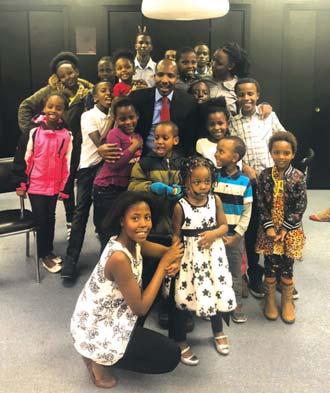
school and was a leader for over 200 youth.
After he moved from his home village to attend a university, he would pay for time with prostitutes so he could share the gospel with them. Two accepted Christ as their personal Savior.
He even shared the love of Jesus with his persecutors.
War in DR Congo made life dangerous for many civilians. Tambatamba’s family was no exception—two of his brothers were killed unarmed.
One night as he was traveling by boat across a large lake, militants attacked him and riders from another village. Tambatamba was disrobed, thrown off the boat and left for dead.
In his panic, he was given a vision. A man clothed in white told him, “Do not fear, I am with you.” As a promise of his safety, he saw himself traveling back to his home village. Coming out of his vision, Tambatamba found himself on the shore of the lake the next morning.
But militants were headquartered in the area. They tied his hands and legs and beat him so severely that he temporarily lost his memory. For 34 days he had no food or water. When he regained his memory, he leaned on God’s promises.
“I wasn’t thinking about myself,” Tambatamba says. “I was meditating on his love. Even though I was hurting and hungry, I didn’t remember that. My spirit was free to praise him. I was joyful.”
His captors threatened him.
“You can’t stop me,” Tambatamba told them. “God promised me I will go back to my village and travel to the nations and tell them about Jesus. Now it is time to release me.”
This joy and confidence turned the hearts of three captors. They believed Tambatamba’s God was alive and begged him to pray for their salvation. Soon after he was sent back home, the only survivor of that prison.
“It shows me there is nothing to fear when I have God,” Tambatamba says. “There is no bad person. I was a bad person, but God forgave me and gave me salvation. God can use me to change other people to be good, even though they are bad to others.”
In 2006, he took his wife and two children with him to Kenya. They wanted to flee the violence of DR Congo and also attend theology school there. He reached out to many homeless youth and led 45 adults to Christ. Some of those adults are now leading the four churches he helped plant in the area.
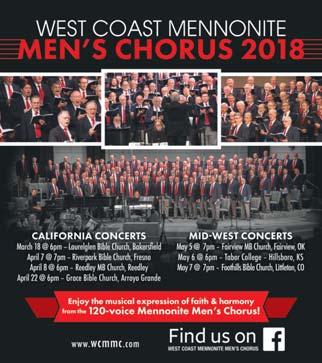
“We are not in the world by accident,” Tambatamba says. “We are here on behalf of Jesus to give good news to the enemies of Jesus. There are brothers and sisters who are lost, and we need to bring them back.”
In 2014, Tambatamba, his wife and their children came to the United States as refugees, as there were still threats on his life. He felt God calling him to be an ambassador of the gospel on a new continent, which gave a broader meaning to God’s promise to preach to the nations.
In 2015, he started New Jerusalem Temple in his apartment in Sioux Falls, S.D. The congregation has expanded to 126 members, the majority of attendees originating from Kenya, Rwanda and the Congo. Services are conducted in Swahili and English.
“I believe they are a family,” Tambatamba says. “I consider it a joy to see brothers and sisters coming together to do the work of God.”
This congregation, led by Pastor Emanuel Nkunda, has already planted churches in Uganda and Kenya. The congregation takes offerings each week for their church plants, local ministry and for renting a meeting facility.
Securing a meeting location is one of the biggest challenges the congregation currently faces. They bounce between two facilities where they can meet when the buildings are not in use.
New Jerusalem’s short-term goals are to reach out to Muslims and other nonbelievers in the area. Eventually, just like any other place he’s lived, Tambatamba hopes to plant other churches.
“That’s the command of God,” he says. “Jesus said, ‘If you love me, you will obey my commandments.’ That’s the great mission of the church.”
But that is easier said than done, he’s observed.
“Some churches are focused on the numbers inside, but our vision is to look outside,” Tambatamba says. “The churches without preaching the gospel of God are doing spiritual genocide to nonbelievers. They will be accountable one day in the presence of God.”
One resource available to New Jerusalem is its partnership with USMB. In November 2017, the church became an official member of the Central District Conference. This connection began when a member needed a facility for their wedding. Ethiopian Christian Fellowship, a Sioux Falls congregation that is also a member of the CDC, offered its building.
Leaders from both congregations began to discuss partnerships and core beliefs. Although the New Jerusalem Temple had received many offers of partnerships from other churches, Tambatamba felt the CDC was best aligned with Scripture and calls that first meeting a “divine connection.”
“We are honored to have this vibrant community of believers join our district,” says Rick Eshbaugh, CDC district minister. “Apostle Claude is a hardworking, humble servant who truly loves the Lord and his people.”
When Tambatamba is not participating in the church’s weekly prayer groups, discipleship or inviting at-risk youth to his apartment, he is often flying back to Africa to train pastors and leaders. He also works as a translator of 14 languages.
“What makes me happy is I have the opportunity to share the good news,” Tambatamba says. “We have the freedom to share our faith. I can stop eating, but I can’t feel good when I don’t share the good news of Jesus Christ.”
Jenae Suderman
Curriculum an effective resource for churches
Loss is an unavoidable part of life. In hopes of resourcing people living with the pain of loss, a contingent of Mennonite Brethren churches are using GriefShare.
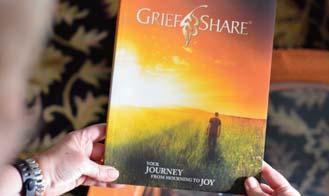
The 13-week GriefShare curriculum is designed for people grieving the death of a loved one and includes video seminars featuring experts on grief and recovery and a workbook for personal study. Groups meet weekly for discussion under the care of a local facilitator.
“GriefShare is like a three-legged stool,” says Velma Goertzen, GriefShare facilitator at Buhler (Kan.) MB Church. “First we watch and listen to others who have gone through grief through a video, then we talk to each other, then we take the workbook home and we talk to God. Those three steps are very important.”
Grief is a journey
Tim Schellenberg, GriefShare facilitator and visitation pastor at Parkview MB Church in Hillsboro, Kan., says the material is accessible for believers and non-believers.
“For people who are not in the church, they need to know that this is a Christian thing—because there are one or two lessons that deal quite a bit about coming to faith, trusting in Jesus,” Schellenberg says. “But I can say, when you’ve had a significant loss, people do reflect on their faith.
“To ignore the spiritual part is not a good thing, but I would be afraid of a program that would push it too hard,” he says. “I think GriefShare does a good balance of that.”
Jenny Akina, facilitator at North Fresno (Calif.) Church, says she appre-
ciates how the GriefShare material is presented.
“It’s very structured, and I really like that about it,” she says. “It’s not just sitting around talking about how sad everybody is. Because we could all do that. It’s focused on a journey, on moving forward, but being very aware that this is all a normal process.
“We think that as Christians, sometimes, we should have it all together, and we shouldn’t be so sad, but the Bible doesn’t say that. The Bible says that we still grieve, but we don’t grieve as those who have no hope,” Akina says.
GriefShare provides a training video for volunteers who lead local groups. While not a requirement for leadership, many facilitators have experienced and dealt with grief themselves.
Akina went through GriefShare twice as a participant, then twice as a helper before facilitating a group at North Fresno.
“I really don’t know how anybody could lead GriefShare without having suffered a loss,” she says. “I would have a hard time going to a GriefShare group with someone who couldn’t really relate on that level.”
Matt Harder, pastor of care and counseling at Reedley (Calif.) MB Church, oversees his congregation’s GriefShare facilitators, selecting leaders who are dealing with grief in a healthy way. He
says he chooses multiple facilitators to avoid burnout or an emotional burden.
Goertzen, who has facilitated GriefShare at Buhler MB twice a year since 2010, says it’s important for facilitators to process their own grief before leading a group.
“They strongly suggest that (facilitators) are at least two years past their own personal grief,” she says. “I see the mistake sometimes when someone has lost a husband, and nine months later, they’re facilitating, and they haven’t gone through their own grief journey yet. Then sometimes that group will stumble.”
Goertzen encourages potential leaders to attend a GriefShare session at another church to use as a model, to ask others in the church to pray during GriefShare
sessions and to ask questions of other churches with GriefShare programs or via the GriefShare website’s forum.
Parkview’s Schellenberg encourages facilitators to foster discussion, since the one-way communication of the video can make the material more difficult to process.
Some churches have found it helpful to schedule GriefShare at specific times of year. Holidays and anniversaries can be especially hard for those living with grief. The one-session video and workbook, “Surviving the Holidays,” is an additional resource.
Buhler MB offers GriefShare twice a year in September and March.
“The one in September ends with the

‘Surviving the Holidays’ in November, and that’s a good way to end a 13-week session,” Goertzen says. “The one in March, you’ve had Christmas and you think, ‘I’ve got this handled,’ and then everything comes crashing down again and you feel like you need support.”
Reedley MB hosts GriefShare groups three times a year: in the fall, spring and early summer either during Wednesday night activities to allow parents to attend without arranging childcare or in the morning for people who want to stay home at night.
At Mountain View Community Church in Fresno, Calif., GriefShare sessions ended Dec. 11, 2017, and facilitator Joel Vogt says that felt too close to the holidays.
Group size is another consideration, as numbers are a factor in engagement. Many churches open GriefShare sessions to the community; others limit the invitation to their own congregations. While there was some variance of opinion, most facilitators suggest groups of four to eight people, with an upper cap of 10 or 12.
Akina recommends waiting at least three months following a loss before attending GriefShare.
Facilitators say the first few sessions of GriefShare may be especially difficult. Most agreed people should attend a minimum of three.
“If you attend just one, it’s overwhelming because you’re hearing others’ grief, and that’s painful, too,” Goertzen says. “But if you attend three sessions, and you follow the flow, then you start making friends in the group and you start seeing the benefits.”
Vogt encourages people to be deliberate in dealing with grief.
“You need to be brave,” he says. “You need to be intentional because if you hide from your grief, it’s just going to get worse.”
Harder echoes the sentiment: “You need to deal with it because if you don’t, it’s like an infection in your body. If you don’t clean out that infection, it’s just going to keep festering. You won’t heal. GriefShare has a way of enabling you to be able to heal from those things.”
Benefits are evident
Whether a church has hosted GriefShare once or for many years, facilitators say the benefits are evident.
Pastor Duane Deckert is the GriefShare facilitator at Bible Fellowship Church in Minot, N.D., where the church has hosted GriefShare the past two years.
“(The video) helps people identify that they aren’t the only ones feeling the way they’re feeling and going through what they’re going through,” Deckert says. “The videos do a great job of opening people up to their own grief and how to work through it.”
Goertzen says she’s received many positive responses, adding that two people have placed their faith in Jesus through the sessions.
“A lot of people say they couldn’t have gone through the grief process without it,” she says. “There’s as many different stories as there are people.”
Vogt brought GriefShare to Mountain View after going through it himself and realizing it was a valuable resource.
“In the beginning sessions, of course, everyone’s hesitant and shy, and some are emotional,” Vogt says. “As the weeks go by, these walls start to come down, and people start sharing on a personal level.
“I believe it’s very worthwhile because the worst thing a person can do is to get stuck in their grief,” Vogt says. “(GriefShare) doesn’t cure anything, but it helps you on your path towards recovery.” —Janae Rempel
Learn about GriefShare and find a group at www.griefshare.org. To read advice on how to comfort someone who is grieving, read the supplemental article online at www.christianleadermag.com.
How sports provide a backdrop for ministry
While ministry outreach and evangelism may look different across the Mennonite Brethren family, it begins with establishing relationships. For two California MB churches, sports have provided ways to get to know local families and point them to Jesus.
Wrestling for relationships
Shafter MB has used wrestling as an outreach for ministry the past nine years.
Senior pastor Pat Coyle wrestled collegiately at Biola University and has served in coaching roles at various levels off and on since 1983. He currently works with Shafter Spartan Wrestling Club, a local club for children in kindergarten through sixth grade. Coyle says it has been his dream to use the sport in ministry. For him, that begins with relationships.
“How do we cultivate relationships
with non-Christians?” he asks. “How do we plant truth in their lives and then pray for a harvest? That all comes down to relationship, so you find ways to connect with them over common interests, and for me, it’s been sports for many, many years.”
Thanks to the addition of a fellowship hall in 2005, Shafter MB has a gym that provides space for outreach. Since 2009, the church has hosted a summer wrestling camp for incoming first through sixth graders. Average attendance is 25 to 30 but has been as high as 50.
Campers “come and hear”
Camp includes deliberate Bible teaching and is what Coyle calls a “come and hear” event, where people hear God’s Word and learn about Jesus. The church sends information about its children’s ministries home with kids.
“I tell people it’s kind of like a wrestling vacation Bible school,” Coyle says. “We have daily lessons and at the end of the week, a little exhibition match.”
Two years ago, Coyle and head club wrestling coach Eli Espericueta, who
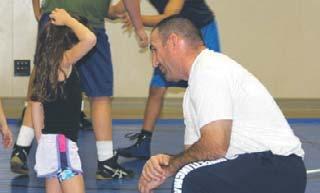
also attends Shafter MB, decided to host a wrestling tournament at church.
Hosted the Saturday before Thanksgiving, the takedown tournament is in round robin format and is ideal for beginning wrestlers. Ten to 15 church volunteers help with the event in addition to club parents. An average of 56 children have attended.
“Wrestling is a big sport around here, so to be able to fill a niche for a fun tournament for beginner kids that’s fairly quick on a Saturday morning seems to work real well,” Coyle says. “We’ve had a good response, so we’re hoping to do it for many, many years.”
The church puts Fellowship of Christian Athletes Bibles geared specifically for wrestlers on a table in the entryway, and Coyle says they’ve given out about 50 in two years.
Families “come and see”
The tournament is what Coyle calls a “come and see” event, where people can come to church and see what Christians do. For Coyle, it’s just another way to cultivate relationships.
“When it comes to evangelism and reaching people for the gospel, to me it always travels through relationships,” he says. “So how do you reach out to nonChristian people? You have to get to know them, and the only way to get to know them is figure out a way to spend some time with them.
“As a pastor, I have encouraged our congregation, ‘When you think about outreach, let’s not make this hard. Think about the things you enjoy and how (God) might want to use that.’”
Basketball camp builds on needs
One of the things Brian Smith, of Dinuba MB Church, enjoys is basketball and that interest prompted Smith to put together a team of 20 adult and youth volunteers to host DMBC Basketball Camp Jan. 2-4, 2018.
“As one of the elders of our church, I have been encouraging our elder team and new ministry teams to use the needs and interests of our community to reach out and connect with the people of our area,” Smith says.
“Since I have triplet 12-year-old chil-
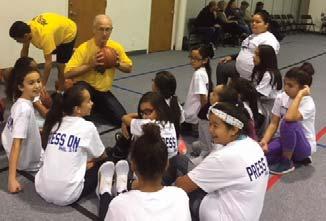
dren who play sports in our city recreation league, I knew that kids would need to be developing their basketball skills at this time; the season was beginning the first week of January,” Smith says. “Since I have loved basketball since a young age and played in high school, this idea fit me like a glove.”
An average of 56 children in first through sixth grade attended camp from 9-11:30 a.m. each day. After stretching exercises and warm-ups, campers rotated between four, 15-minute stations, each focusing on a specific drill: shooting, passing, ballhandling and defense.
Each morning concluded with a motivational chat related to the camp’s theme of “Press On,” based on Phil. 3:14. Topics included persevering in life by focusing on Jesus, making wise decisions and trusting God, and choosing Jesus as one’s goal and prize.
The purpose of the event, Smith says, was about more than developing basketball skills. It was intended to build connections with families and share the gospel.
“I believe the key is finding that sport, or any interest for that matter, that resides in the community, and then linking it with the skills, gifts and resources within the church body,” Smith says. “Timing for me was an important key as well. When a need arises within the community, that is the right time for the church to move into action.”
The event was well-received, Smith says, with opportunities to converse with parents who stayed to watch their children play. At the end of camp, seven children made first-time decisions to follow Jesus. The church is following up with phone calls, an invitation to church and a gift of a new Bible.
Smith says Dinuba MB plans to host the basketball camp again next year and hopes it becomes an annual event. —
Janae Rempel
If you are a pastor or local church leader who is interested in learning how your congregation can multiply efforts to grow disciples and connect with people who don’t yet know Jesus, you are invited to Multiply 2018.
The two-day conference will be held at Mountain View Community Church in Fresno, Calif., April 25-26, 2018. Multiply is intended to equip and encourage church leaders to multiply the gospel in their communities through local, national and global mission strategies in order to make disciples more effectively.
“We want to encourage every pastor, every staff person and every church leader to attend this event that seeks to beautify the call of Jesus to join him in his mission to make disciples of all nations,” says Scott Thomas, director of C2C US. “You can do it; we can serve alongside to accomplish much for Jesus.”
The conference is geared toward a wide variety of people: senior pastors who want to lead their churches toward multiplication; associate leaders and pastors who want to empower their church leaders to implement missional works by faith; church leaders interested in the principles of replanting a declining church; leaders who are discerning God’s call for future ministry; those who are curious about their calling into church planting; and churches who want to see more gospel-centered churches in the U.S. expanding the good news of Jesus.
Why attend Multiply? Planting a church, starting a new campus or a new service, replanting a church, or investing in church planting globally is an intimi-
dating proposition if a person thinks he or she is alone. Multiply will help people realize that there is a team of people— C2C Network, MB Mission and USMB—who are dedicated to coming alongside churches as they take the step of faith to multiply.
Multiply will feature numerous stories and examples of average-sized churches that believed the risk was worth it and allowed God to bring the fruit. The conference has potential to clarify and strengthen one’s call and resolve to expand the gospel to the ends of the world.
“The Multiply Conference is a time to learn new ideas and get recharged for multiplying your ministry—effectiveness for evangelism and disciple-making,” says USMB National Director Don Morris. “It’s planned for whoever
has a desire to see God multiply their efforts for reaching people with the gospel and for expanding his presence in their own life. It’s for young and old, male and female, leaders and followers, pastors and non-pastors. Come and learn.”
The event is being planned by the C2C National Team, which includes Thomas; Morris; Brad Klassen, lead pastor at Copper Hills Church in Peoria, Ariz.; Fred Leonard, lead pastor at Mountain View; Paul Robie, lead pastor at South Mountain Community Church in Draper, Utah; and Brent Warkentin, lead pastor at First MB Church in Wichita, Kan.; with Gord Fleming, C2C North American director.—C2C US
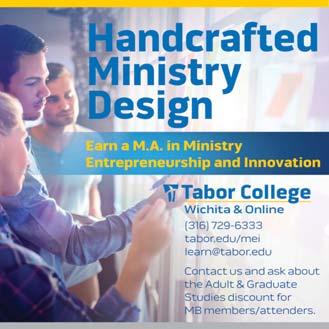
Event designed to equip, resource local church
USMB is collaborating with MB Mission and C2C US to present a new series of LEAD One events focusing on evangelism and disciple-making. Randy Friesen and Phil Wagler of MB Mission and Gord Fleming and Scott Thomas of C2C Network are working with Don Morris, USMB national director, to plan the one-day events, and the five ministry leaders will
serve as resource speakers. Regional MB Mission mobilizers Stephen Humber, for the Midwest, and Galen Wiest, for the western U.S., are also part of the planning team.
“With the merger of the C2C Network with MB Mission, we have the opportunity to explore and clarify together what living on mission means here in North America,” says Friesen, MB Mission general director, in his January 2018 Vision for Mission email. “Our interest is to serve local churches and our conferences in their strategic mission vision so that collectively we will become more fruitful and effective.”
Morris says the content of the various sessions will focus on “the One Mission we are on as Mennonite Brethren lo-
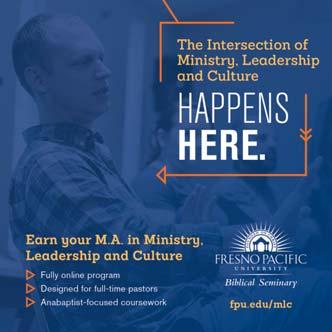
cally, nationally and globally, how we will work in concert with one another to fulfill this vision and how the various agencies will assist our local churches for intentional disciple-making and evangelism.”
According to Morris, LEAD One participants will learn what resources the three presenting agencies have to offer local churches in the mission and ministry of evangelism and church planting.
“We won’t just list the resources available,” he says. “We’ll also share directly how the local church can build a church-wide culture of evangelism and disciple-making, learn new ways of addressing this aspect of ministry and develop a strategy for getting it done.”
For example, Wagler will present a nine-point mission strategy map developed by MB Mission to help church leaders identify where their congregations are currently oriented on the map and where the Holy Spirit is leading them in the future.
“I pray that leaders will discover new hope and vision for the season they are in and practical steps for joining God in his mission activity locally, nationally and globally,” Wagler says in an email.
Locations and dates for LEAD One events on evangelism and intentional disciple-making are: The Bridge Bible Church, Bakersfield, Calif., on March 19; Butler MB Church, Fresno, Calif., on March 20; GracePoint@Grulla, La Grulla, Texas, on March 24; Pine Acres MB Church, Weatherford, Okla., on April 12; First MB Church, Wichita, Kan., on April 13; and Lincoln Hills Bible Church, Sioux Falls, S.D., on April 16.
The cost per person is $15 and covers lunch and breaks. Congregations are encouraged to send their leadership team and to include men and women of all ages. To register, visit www.usmb.org— USMB
As USMB continues to work toward the fulfillment of the new collective vision that was affirmed at the July 2016 convention, an essential partner for realizing many of the facets of this path forward has been MB Foundation (MBF), the stewardship ministry for the Mennonite Brethren church family in the United States.
Not only has MBF been a major funding supporter for USMB, but there have been other ministry connections as well. Jon Wiebe, MB Foundation’s president and CEO, serves on both the USMB Leadership Board and the National Strategy Team, a team designed to provide ongoing strategic ideas and analysis for getting the new vision mobilized.
When asked in an email interview what encourages him most about the relationship between USMB and MBF, Wiebe writes: “I’m encouraged by the culture of support, encouragement and genuinely desiring what is best for each ministry and for the whole of our MB family. It is not a competition between MB ministries, but a relationship of seeking what is best for the family. I see us cheering each other on to greater kingdom impact and service to our national family.”
Don Morris, USMB national director, says that many people in the MB family do not fully realize the many ways that various agencies, including MB Foundation, work together in order to fulfill the vision God has given.
“I’m not sure we’ve done the best job of telling the stories about how

various agencies are collaborating now—perhaps as never before in our history,” Morris says. “MB Foundation provides a wealth of information and services for our MB family concerning finances and investing for kingdom impact. But, they need to know that MB Foundation has been there to provide building/property loans for new church plants so they can have adequate space for ministry. Oftentimes, these church plants are just gaining financial footing, so MB Foundation’s willing involvement comes at a critical time. That’s just one example of how the Foundation has been a support for spreading the gospel.”
MBF has a servant heart for ministry throughout our conference.
“MB Foundation’s entire focus is to provide stewardship products and services to the MB family, including individuals, churches and agencies,” Wiebe writes. “This leads us to ask, ‘How might we serve you better?’ The interplay is great, but our impact can be even greater as we strive together for the benefit of each other, our MB family and the world.”
As people invest with MB Foundation, proceeds from these invest-
ments turn into ministry support. The MBF motto of “giving meaning to money” is not just a combo of nifty words, but the true mission of MBF.
“God has blessed the ministry of MB Foundation in many ways,” writes Wiebe. “I want to steward the ministry wisely, to strengthen the local church and impact the world for Christ. I’m excited to continue finding new ways the resources (people, building, skills, influence, money, etc.) of MB Foundation might be leveraged to strengthen our USMB national office and district ministry, to provide greater impact in serving the local church.”
Morris says, “We’d simply be at a standstill without the financial and ministry support of MB Foundation. They have continually upped their game, and together we’re all incredibly serious when we say that we (Mennonite Brethren) are doing all we can to greatly impact our nation for Christ. That’s what it boils down to. Money, buildings, funding mechanisms, servant leaders, investments, ministries—it’s all God’s and works together for his kingdom.”—USMB news story ◗
“And Jesus came and said to them, ‘All authority in heaven and on earth has been given to me. Go (pursue or continue on one’s journey) therefore (since this is true) and make disciples (adherents of knowledge and practice) of all nations, baptizing them in the name of the Father and of the Son and of the Holy Spirit, and teaching them to obey everything that I have commanded you. And remember, I am with you always, to the end of the age,’” Matt. 28:18-20 (NRSV), with additions from Strong’s Greek Lexicon.
What do we mean in our USMB vision statement by “intentional discipleship”?
We have two intentional disciplemaking Deborah Maple trees in our front yard. The Deborah is a species variant of a Norway maple tree noted for its spring leaves which begin as a deep maroon but turn green in the summer before showing off a yellow fall foliage. Annually they produce the annoying helicopter-like seedpods by the billions. Incredibly, each seedpod contains the exact DNA capable of producing another Deborah maple tree. They are making disciples!
Each of our Deborah trees are constantly changing and adapting. Underground, their unique root systems go wherever they need to go to receive nutrients. If they are blocked or cut, they will grow around the obstruction. Above ground there are some outward differences in appearance, because when a branch breaks or is pruned, it restructures to fill the void with new growth.
The trees remind me of Jesus in Luke 9:51: “As the time approached for him to be taken up to heaven, Jesus resolutely set out for Jerusalem” (NIV).
Resolutely—undeterred, single focused, tenacious, sacrificial, intentional.
Our focus as a denomination is to empower local churches (groves of trees) to reach their full God-given (disciple-making ministry) potential within the framework of our Evangelical Anabaptist distinctives, like a Deborah Maple.
With over 200 churches reaching multiple demographics, we have thousands of individuals in relationships with millions, daily carrying the transformational relationship of Jesus Christ. In network, we can carry one another’s burdens, strategize resources, discern teaching, glean best practices, develop leaders, encourage and celebrate!
This was Peter’s vision as well: “Simon Peter, a servant and apostle of Jesus Christ, to those who through the righteousness of our God and Savior Jesus Christ have received a faith as precious as ours: Grace and peace be yours in abundance through the knowledge of God and of Jesus our Lord. His divine power has given us everything we need for life and godliness through our knowledge of him who called us by his own glory and goodness. Through these he has given us his very great and precious promises, so that through them you may participate in the divine nature and escape the corruption in the world caused by evil desires. For this very reason, make every effort to add to your faith goodness; and to goodness, knowledge; and to knowledge, selfcontrol; and to self-control, perseverance; and to perseverance, godliness; and to godliness, brotherly kindness; and to brotherly kindness, love. For if you possess these qualities in increasing measure, they will keep you from being ineffective and unproductive in your knowledge of our Lord Jesus Christ,” 2 Peter 1:1-8 (NIV).
Let the helicopters fly!◗

Rick Eshbaugh serves with his wife, Esther, as the Central District Conference minister and represents the CDC on the USMB Board of Faith and Life, Leadership Board and National Strategy Team as well as the Tabor College Board of Directors. Eshbaugh is a 1985 graduate of MB Biblical Seminary, now Fresno Pacific Biblical Seminary, and has served as a USMB pastor in Oklahoma, Kansas, Washington, Oregon and North Dakota. He also worked for several years with Church Resource Ministries as part of the national reFocusing team.
Shanon Bengston, Julie Bengston, Willard Bengston, Joyce Bengston, Kaylan Martin, Danielle Prieb and Pam Thiessen were received as members Jan. 28 at Zoar MB Church, Inman, Kan.
Marah Franz was baptized Jan. 21 at ParkviewMB Church, Hillsboro, Kan.
Sharon Mahan and Lyndon Perry were baptized Jan. 7 at Pine Acres Church, Weatherford, Okla.
Chris Christensen and Linda Christensen were baptized Dec. 10 and received as members Jan. 7 at Grace Community Church, Sanger, Calif.
Natalie Hamm, Dalton McAlister and Evy Hartling were baptized Dec. 24 at Enid (Okla.) MB Church.
Michael Butler was received as a member Dec. 18, 2017, at Lustre (Mont.) MB Church.
Sean Christensen, Suzanne Christensen, Brandon Thompson, Althea Bullard, Kathy Quayle and Brandon Quayle were baptized Dec. 10 at South Mountain Community Church, Saint George (Utah) campus.
Corn (Okla.) MB Church is planning to celebrate the 125th anniversary of its founding on Nov. 11, 2018.
Madeleine Cameron is student ministry intern at College Community Church, Clovis, Calif., this spring.
Charlie Worley is serving as interim pastor at Buhler (Kan.) MB Church.
The Enid (Okla.) MB Church held a farewell meal Dec. 17, 2017, for lead pastor Scott Gassoway and his family to thank them for their ministry.
Jerred Unruh concluded his ministry at Ebenfeld MB Church, Hillsboro, Kan., in September.
Anderson, Milton, Corn, Okla., member of Corn MB Church, May 5, 1928—Jan. 22, 2018. Parents: J. Axel and Selma Anderson. Spouse: Maxine (Lundell) Anderson. Children: Donita Thiessen, Loraine Yoder, Keith, Linda Suderman; 11 grandchildren; 11 great-grandchildren. Bartel, Larry Gene, Hillsboro, Kan., member of Hillsboro MB Church, Jan. 26, 1946—Dec. 1, 2017. Parents: Albert F. and Anna (Penner) Bartel. Spouse: Yolanda Boese. Children: Kevin; one grandchild.
Beck, Marty Ray, Sawyer, N.D., member of Bible Fellowship Church, Minot, N.D., Aug. 29, 1968—Nov. 17, 2017. Parents: George and Doris (Neufeld) Beck.
Eitzen, Leland “Lee” Mark, Fairview, Okla., member of Fairview MB Church, April 20, 1954—Dec. 27, 2017. Parents: Wesley and Lauretta (Martens) Eitzen. Spouse: Naomi Ruth Vogt, deceased. Children: Jennifer Cabral, Jessica Eitzen; one grandchild.
Elrich, Richard, Bakersfied, Calif., member of Rosedale Bible Church, Bakersfield, July 23, 1929—Dec. 27, 2017. Parents: John and Martha Elrich. Spouse: Pauline Elrich, deceased. Children: Daryl, Sheri Sardo, Ted; seven grandchildren; six greatgrandchildren.
Enns, Victor, Vista, Calif., member of Reedley MB Church, Nov. 30, 1930— Sept. 15, 2017. Parents: Rev. D.H. and Sara Balzer Enns. Spouse: Katherine Isaak Enns. Children: Douglas, David, Candace Healey, deceased, Sandi Greene; nine grandchildren; five great-grandchildren.
Prayer was the focus when Axiom Church dedicated its new building in Old Town Peoria, Ariz., Sunday, Jan. 28, 2018. The celebration began at the Peoria Performing Arts Center, the church’s temporary site, then the congregation walked to the new property, funding for which was secured through MB Foundation. After praying in front of the property, people transitioned inside, where they had opportunity to pray at various prayer stations throughout the building as they toured the property.
“This is a project of pioneering proportion,” Pastor Gavin Linderman says. “As we dreamed and prayed, we felt a strong sense of peace in creating a space that was alternative to your regular church building. It is not designed to be ‘huge’ or ‘flashy,’ overtly traditional or contemporary but instead designed to summon a sense of reverence without the buzz church words on the wall. It is a space that fosters intimacy instead of the trivial.”
According to Linderman, who is also director of inreach, the space will be used for city and neighborhood activities, including hip-hop dance classes for children, holy yoga, weekly forums and study hours for schools.
“This all gives us an onramp for relationship-building, community investment and discipleship opportunities,” Linderman says. “Beyond that, we will host theology nights, musicianary workshops and leadership workshops and a monthly pastors’ network and training lunch in addition to our weekly gatherings.”
Built in 1926 by the city’s first council member, the building was originally a lumberyard and is a historic rehabilitation project. The building features an exposed truss ceiling and a boutique monochromatic lobby housing check-in stations, event registration and a Will Call box for special events. The children’s area and office space double as an art gallery or studio during the week, and there is an outdoor area for children to play. The building is adjacent to Driftwood Coffee, a for-profit shop the church has partnered with in the community.
The grand opening has not been officially scheduled, but Linderman says the church hopes to open by midMarch with a celebration service including food trucks and yard games.

Frueh, Lila (Friesen), Reedley, Calif., member of Reedley MB Church, Feb. 3, 1939—March 16, 2017. Parents: Henry and Louise Friesen. Spouse: Marlowe Frueh. Children: Karen Bennett, Bryan; five grandchildren; four great-grandchildren.
Heinrichs, Wallace Dean, Corn, Okla., member of Corn MB Church, Dec. 18, 1935—Jan. 2, 2018. Parents: Samuel Jacob and Emma Catherine (Willems) Heinrichs. Spouse: Marjorie (Janzen) Heinrichs, deceased. Children: Cassie Moses, Randy, Steven, Robert; 10 grandchildren; 10 great-grandchildren.
Hofer, Jonathan “Jonas,” Fresno, Calif., member of North Fresno Church, July 31, 1924—Dec. 2, 2017. Parents: John K. and Mary E. Hofer. Spouse: Lavina Heinrichs, deceased, Frances Pauls, deceased, Regina “Jennie” Peters. Children: Myron, Jeanette, JoAnne, Joyce, Julie, Janice; 12 grandchildren, 16 great-grandchildren.
Marlatt, Letha (Bartel), Shafter, Calif., member of Shafter MB Church, Feb. 23, 1925—Dec. 9, 2017. Parents: Zacharias & Ida (Rogalsky) Bartel. Spouse: Robert Marlatt, Jr., deceased. Children: Nancy, Dennis, both deceased.
Olfert, Elvin A., Lustre, Mont., member of Lustre MB Church, April 30, 1923—Dec. 23, 2017. Parents: Dietrich and Katharina (Franz) Olfert. Spouse: Selma (Toews) Olfert. Children: Jeanette, deceased, Kenneth, Ronald; nine grandchildren, 25 great-grandchildren.
Rosedale, Roy Stanley, San Bernardino, Calif., member of Dinuba MB Church, April 6, 1933— Nov. 25, 2017.
Sawatsky, Leona Esther (Warkentin), Abbotsford, BC, former member of Bethesda Church, Huron, S.D., March 15, 1924–Oct. 10, 2017. Parents: David H. and Annie (Ewert) Warkentin.
Spouse: Abram J. Sawatsky, former pastor at Bethesda Church, now deceased. Children: Ken Sawatsky, Marlene Sawatsky Hohm, Dan Sawatsky, Sharon Schermbrucker, Dorothy Sawatsky, David Sawatsky, Ron Sawatsky; 13 grandchildren; 14 great-grandchildren.
Siebert, Minnie (Regier), Buhler, Kan., Buhler MB Church, Oct. 13, 1917—Dec. 21, 2017. Parents: Abraham T. and Katie (Fast) Regier. Spouse: Waldo Siebert, deceased. Children: Jay, Richard, Mary; seven grandchildren; seven great-grandchildren.
Stelting, Marie (Kroeker), Corn, Okla., member of Corn MB Church, Jan. 20, 1921—Dec. 12, 2017. Parents: Henry H. and Helen (Boese) Kroeker. Spouse: Arthur Otto Stelting, deceased. Children: Mary Goodsell, Jerald; six grandchildren; 12 great-grandchildren; five great-great-grandchildren.
Wahl, Frances Arlene (Hein), Fairview, Okla., member of Fairview MB Church, Sept. 28, 1926–Jan. 6, 2018. Parents: David and Marie Hein. Spouse: Lyndon Wahl, deceased. Children: Kelly, Mac, Diane Mason; four grandchildren; 11 greatgrandchildren.
The Bridge Bible Church, Bakersfield, Calif., hosted an intentional parenting conference Feb. 9-10 led by Phil and Diane Comer, the founding pastor at Westside: A Jesus Church in Portland, Ore. The conference’s purpose is to give parents biblical understanding of what it looks like to raise passionate Jesus followers.
The Southern District Junior High Youth Conference was held Jan. 20, 2018, at Cross Timbers Church in Edmond, Okla., with 170 youth and sponsors in attendance. The one-day event included worship sessions, a service project and free time.
The theme of the event was “The Missing Peace.” Speaker Sara Jo Waldron, Youth Pastor at Hillsboro (Kan.) MB Church and chair of the Southern District Youth Commission, spoke during two sessions about what it means to be a peacemaker and follow Jesus, the Prince of Peace. During another session, the youth packed 15,884 freeze-dried meals in 30 minutes to be delivered to the Regional Food Bank of Oklahoma.
“We didn’t just come together and hear about the importance of peace, but we spread peace through a really practical way of feeding families in need in the Oklahoma City area,” Kevin Larson says. “It’s really hard to hear that God loves you or that he has a plan for you if
Hillsboro (Kan.) MB Church offered a 12-week Discipleship U course, “Essential Truths,” designed to help people understand the foundational truths of Christianity. The Local Outreach Board sponsored a training Feb. 11 designed to better equip people to help others find faith in Jesus.
North Fresno (Calif.) Church joined other area churches to start 2018 with 21 days of prayer and fasting.
Parkview MB Church, Hillsboro, Kan., participated in 21 Days of Prayer, Jan. 7-28. People prayed for God’s leading in their personal lives, at Parkview and across Marion County.
Laurelglen Bible Church, Bakersfield, Calif., celebrated 40 years of ministry Jan. 14. Former pastor Ed Boschman preached.
Valleyview Bible Church, Cimarron, Kan., held a Valentine banquet Feb. 10, including a steak dinner, auction and entertainment to benefit mission trips.
Hillsboro (Kan.) MB Church men’s ministry hosted a Valentine’s Extravaganza Feb. 3 with a meal and entertainment by “I Am They.”
The women’s ministry group at Zoar MB Church, Inman, Kan., held a soup and salad supper Jan. 18. Special speaker was Taryn Jost, pastor’s wife and mother of four.
Rosedale Bible Church, Bakersfield, Calif., held a potluck, party and prayer night on New Year’s Eve.
your stomach’s empty, but let’s fill those stomachs and then we can talk to them about God.”
Larson, the SDC youth commission member responsible for planning the event, says the event was well-received and credits Cross Timbers with buying into the vision and helping to create a successful event. “I love that we’re as a conference really focusing on this age group and…providing this for them,” Larson says. —CL

Hillsboro (Kan.) MB Church hosted local middle school and high school students and their youth leaders for a free event Feb. 7 featuring illlusionist Zak Mirdzadeh.
Bible Fellowship Church, Minot, N.D., sponsored a Good News Club at Longfellow Elementary beginning Jan. 17.
People at Salem MB Church, Freeman, S.D., made 196 dozen cheese pockets Jan. 21, with a profit of $3,000 to be used for camp scholarships.
Eight women from Bethel MB Church, Yale S.D., joined others to make quilts in Huron. The women did a matching fund with Everence and gave $1,500 toward quilting supplies. Twenty-one quilts were tied and hemmed and given to families in need.
The Amor y Fe congregation at Butler Church, Fresno, Calif., hosted a Kings Day celebration Jan. 7 for children from church and the community. The event included music, Asian dance and a Christmas play.
Local Church Job Openings
Youth Pastor: Garden Valley MB Church, Garden City, Kan., is seeking applicants for a full-time youth pastor with a passion for the spiritual development of youth as disciples of Christ. A full job description is available on our website www.gardenvalleychurch.com. To apply, please send resume to gvchurch@gmail.com.
Education Job Openings
School Principal: Heritage Christian Schools (http://www.heritageschools.us) is seeking applicants for the position of School Principal. For 50 years the primary focus of HCS has been to educate students spiritually, academically, physically and emotionally. The successful candidate will model spiritual leadership to promote educational growth and achievement with students, staff and
parents. Salary TBD by education and experience. Applications are due by 4/2/18. Send resume and letter of interest to pastoraiken@sbcglobal.net.
Director: Fresno Pacific University is seeking qualified candidates for a Director of Liberal Arts –Degree Completion. Complete job description and faculty application may be viewed online at the Fresno Pacific University website: www.fresno.edu/careers.
Faculty: Fresno Pacific University is seeking a faculty member in business, with speciality in finance and Graduate Program Director in the School of Business. Complete job description and requirements at www.fresno.edu/careers.
As a service project, junior high youth at Zoar MB Church, Inman, Kan., assembled luminaries for use in the city’s Live Nativity and Christmas celebration on Dec. 16.
Mountain View Community Church, Fresno, Calif., hosted a kick-off service Jan. 7 for 21 days of citywide prayer and fasting Jan. 8-28, involving nightly fasting prayer services at churches in the Fresno and Clovis area.
The Bridge Bible Church, Bakersfield, Calif., sent a team to Ensenada, Mexico, Feb. 16-18 to build houses for people in need.
Ministry Job Openings
Executive Director: Grace Children’s Home, Henderson, Neb., is actively seeking applications for the position of Executive Director. For many years, the primary focus of this ministry has been providing residential care for teenagers that have been placed out of their home by the court system. The successful candidate will work with the Board of Directors to determine both short-term and long-term goals of the organization as we move forward. Inquiries can be sent to chuck@gracechildrenshome.com or call 402-723-5725.
Shafter (Calif.) MB Church women’s ministries collected 67 pounds of gently-used costume jewelry for “Loja Vida Mais” (More New Life), a secondhand store in Massama, Portugal, operated by a Mennonite Brethren church in that community. Heidi Wilson, chair for the Shafter MB women’s ministries committee, came up with the idea while visiting her parents, MB Mission missionaries Otto and Marjorie Ekk, in Portugal. The secondhand store, funded by Friends of Portugal and managed by a local MB pastor’s wife, provides low-cost clothing and other items to the Massama community. The store receives donations of clothes from the community and elsewhere, Wilson says, but jewelry is in high demand.
“One thing they don’t have a lot of is jewelry,” she says. “Every woman likes to feel pretty. The Dinuba (Calif.) MB Church a couple years ago had done a jewelry drive, and my mom had mentioned that it went over so well—getting a bunch of fun, new stuff.”
Wilson brought the jewelry drive idea back to Shafter, where the women’s ministries committee decided to take on the outreach project. The church collected gently-used costume jewelry over a six-week period beginning in December and also paid for the extra suitcase the Ekks used to take the jewelry to Portugal. The jewelry drive culminated with a Jan. 9 event, during which Marjorie Ekk, who was visiting for the holidays, shared about the secondhand store and its ministry.
The store’s manager, Maria Mente, is the wife of Moisés Mente, pastor of Igreja Evangélica Irmãos Menonitas da Amadora (Amadora Evangelical MB Church). Through the secondhand store, Maria Mente ministers to women through counseling and prayer. “It’s just been amazing how ladies have opened up by coming to this neutral location, a little secondhand store,” Wilson says.
The store planned a special jewelry display in mid-February.

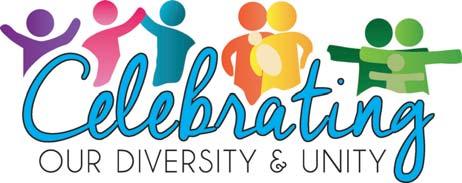

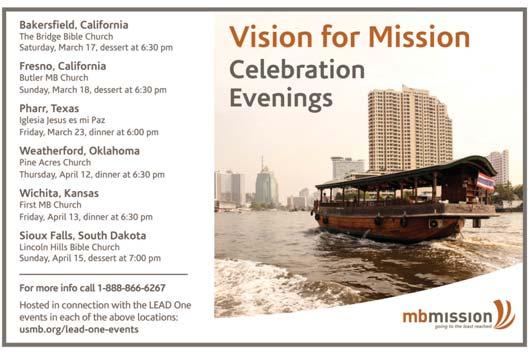
Will you join this mission of new beginnings?
This year is shaping up to be perhaps one of the most significant in our 158-year Mennonite Brethren history. I know this is a rather brash statement, but I’m serious. Let me explain.
Over the past several months, there has been a tremendous amount of collaboration among USMB agencies to respond to the vision that God is giving to us to center ourselves on One Mission—local, national and global. This mission is to see more people become followers of Jesus while there is still time.
It’s a vision of coming together to do all we can to help our MB churches maximize their efforts of intentional disciple-making, evangelism and assisting in the multiplication of churches. That’s a mouthful, but it’s a growing passion among MB leaders to see this happen. It’s an extravagant vision that I pray will spread like wildfire among our MB family.
Collaborators include Randy Friesen, MB Mission general director; Gord Fleming, C2C North American director; Scott Thomas, C2C US national director; Jon Wiebe, MB Foundation president; our five district ministers, Rick Eshbaugh, Aaron Hernandez, Terry Hunt, Tim Sullivan and Gary Wall; numerous other leaders from these agencies, our USMB staff and the USMB Leadership Board. Working together, we are poised for an unprecedented season of collective mission and ministry impact. We anticipate inviting our educational leaders and other men and women of a variety of ages to help us shape the path forward.
Randy Friesen recently wrote that this is a time of “new beginnings for our conference of churches. We have
the opportunity to explore and clarify together what living on mission means here in North America.” This is indeed a time of new beginnings as we move toward a greater level of living on mission in our communities. I strongly believe that God intends to use our MB family for significant mission and ministry. So much so that I am praying that we might be one of the catalysts that God uses to bring multitudes to his family. People all across this land are broken and without a Shepherd. We must care about that. We must be the church as God intended—the church as God’s means, his ambassadors, of the gospel. The powerful words of Jesus speaking to his disciples come to mind: “You will receive power when the Holy Spirit comes on you; and you will be my witnesses in Jerusalem, Judea, Samaria and to the ends of the earth” (Acts 1:8). This is our One Mission—local, national and global.
Pastor, will you join us? Church leader, will you join us? MB churches across America, will you join us in this mission of new beginnings? Is it possible for us as a conference of churches to catch spiritual fire and to allow our small concerns and differences to fade away so that together we can be sold out to see more come to know him? I fervently pray this is so.
You’ll be hearing about upcoming LEAD One events, regional events presented by the agency leaders I mentioned above, meeting with you for one day to work together on a strategic plan for this One Mission— local, national and global. Please come and bring many with you. I pray that you’ll want to be a part of what is God doing among Mennonite Brethren in our land! ◗

Don Morris began serving as the USMB national director Aug. 1, 2016. Prior to accepting this new position, Morris served as the USMB interim executive director for two years and as the director of Mission USA since 2004. He and his wife, Janna, live in Edmond, Okla., where they attend Cross Timbers Church.
